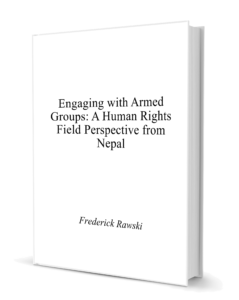
Frederick Rawski
Read PDFRead PDFTheoretical uncertainty surrounding whether and to what extent non-state actors are obligated to abide by international human rights and humanitarian norms has impacted the policies and practices of human rights field presences, including those of the United Nations. The paper presents the case of Nepal, where international organizations have been forced by circumstance to engage with a range of non-state armed groups, to illustrate how current limitations of human rights law regarding non-state actors impact the work of human rights field monitors. Drawing upon the global administrative law paradigm, it argues for the development of a ‘soft law’ framework governing human rights aspects of international organizations’ engagement with armed groups.

